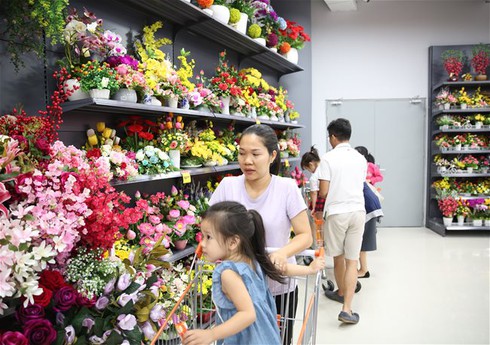 |
| Consumers at a supermarket in HCMC. McKinsey’s recent survey found that Vietnamese consumers are some of the most optimistic in Asia during the COVID-19 pandemic – PHOTO: THANH HOA |
The survey, which was conducted among 618 consumers in Vietnam and covered their consumption behavior shifts during the COVID-19 crisis, showed that only 4% of Vietnamese think the crisis will have a longlasting impact on the economy.
Among all countries surveyed, only China is more confident, with 3% of respondents agreeing with this statement. This is compared to 6% in Indonesia, 16% in the United States and 24% in the Republic of Korea.
Some 47% of Vietnamese respondents believe the economy will rebound within two to three months and grow just as strong as or even stronger than it was before COVID-19. This figure in the United States, the Republic of Korea and Japan is 39%, 13% and 6%, respectively.
Nevertheless, the economic impact on Vietnam will be significant, with most international agencies forecasting gross domestic product (GDP) growth of some 3%-5% in 2020, compared to some 7% annually in previous years.
The outbreak affected all of Vietnam’s principal trade and investment partners including the European Union, China, the Republic of Korea, Japan and the United States, who together make up 70% of the country’s trade volume.
Moreover, physical distancing measures, combined with pressures on livelihoods are still causing significant and lasting changes in the consumption behaviors of the Vietnamese.
Nearly half of the Vietnamese are feeling the impact on their livelihoods, with some 70% expecting to be more careful with their spending. This leads to lower spending expectations across categories, except for essential items such as groceries and food delivery and telecommunications services.
Meanwhile, Vietnamese are spending more time on exercising and cooking as well as consuming news and media. They are expected to cut their spending and focus on value-based offerings.
More than four in five Vietnamese respondents stated that they are more focused on their health, reflected by the increase in the consumption of products that are perceived to be healthy such as eggs, fresh foods and healthcare products. Among the Southeast Asian countries surveyed, Vietnam also demonstrates some of the strongest focus on buying locally made goods.
Compared with other markets, Vietnamese consumers have been loyal to their favorite stores during the crisis, unless the store is too far away from their homes or is out of stock. Nearly 40% of Vietnamese respondents said they switched stores during COVID-19, while the figure in Indonesia, Thailand and Australia is 48%, 45% and 41%, respectively.
Vietnamese consumers’ top three reasons for switching are choosing a location closer to home (46%), the availability of online or app-based channels (42%) and an adequate stock of essential items (37%).
However, the survey found significant changes in brand choices. Up to 75% consumers in Vietnam have switched brands during the pandemic. This figure is much higher than in some other Asian markets such as Japan, at 9%; the Republic of Korea, 17%; and China, 32%.
Based on these findings, McKinsey suggested four areas where grocery retailers need to rethink their approach: safety, health and the scope of supply chains; how technology can enable delivery and the value chain; the meaning of value for money; and consumer loyalty. SGT
 Vietnamese consumers are some of the most optimistic in Asia during the COVID-19 pandemic, according to American management consulting firm McKinsey’s recent consumer survey.
Vietnamese consumers are some of the most optimistic in Asia during the COVID-19 pandemic, according to American management consulting firm McKinsey’s recent consumer survey.